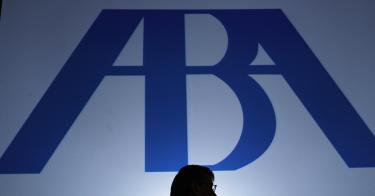The American Bar Association’s ratings used to be—as Democratic Sens. Patrick Leahy of Vermont and Charles Schumer of New York have often told us—the “gold standard” for evaluating judicial nominees.
Now, they’re just fool’s gold.
The American Bar Association has given a “not qualified” rating to nine of President Donald Trump’s 211 judicial nominees. Trump withdrew two, and the Senate has confirmed five others, two without opposition.
Meanwhile, Sarah Pitlyk, tapped for the U.S. District Court for the Eastern District of Missouri, has had her Senate Judiciary Committee hearing, and Lawrence VanDyke, nominated Oct. 15 to the U.S. Court of Appeals for the 9th Circuit, had his hearing Wednesday.
Presidents used to seek the bar association’s opinion before even nominating someone to the federal bench.
Today, however, its ratings are mentioned when they help and ignored when they don’t. The truth is that the American Bar Association has no one to blame but itself.
>>>View the Judicial Appointment Tracker
It has been rating judicial nominees since the late 1940s, first as input for the Senate Judiciary Committee and then at the invitation of the Eisenhower administration.
That attention seemed justified because, as the nation’s largest association of lawyers, the American Bar Association focused on the profession, rather than politics.
In 1965, Lewis Powell, who was then the bar association’s president and would later become a Supreme Court justice himself, wrote in the ABA Journal that “the prevailing view is that the Association must follow a policy of noninvolvement in political and emotionally controversial issues.”
That was wishful thinking.
The ABA’s House of Delegates soon began passing resolutions on those very issues. From capital punishment and gun control to racial preferences, abortion, gay rights, immigration, and beyond, the American Bar Association embraced the liberal political agenda.
What kind of firewall could keep politics out of the bar association’s judicial nomination ratings when members of its evaluation committee come from its House of Delegates?
That question became more urgent when, in 1987, several of its evaluators said that Robert Bork, President Ronald Reagan’s nominee, was “not qualified” to serve on the Supreme Court.
A decade later, in 1997, when he chaired the Senate Judiciary Committee, then-Sen. Orrin Hatch, R-Utah, wrote that “the judicial confirmation process should not be tainted by continuing to confer a special, officially sanctioned role on an organization that has evolved into a political interest group.”
The American Bar Association and its ratings have been on a downward spiral ever since.
In 1993, for example, President Bill Clinton ignored the bar association’s “not qualified” rating and nominated Alexander Williams Jr. to the U.S. District Court in Maryland.
Civil rights groups said that the rating, based on concerns about Williams’ professional competence, showed the bar association’s bias against a black nominee. Both the Judiciary Committee and full Senate unanimously approved the nomination, the latter without even taking a recorded vote.
Examples accumulated of comparatively qualified Republican and Democratic nominees receiving different ratings. Criticism was so steady that scholars began trying to determine whether the bar association’s ratings were systematically biased.
In the decade from 2001 to 2011, four different studies (here, here, here, and here) concluded that the answer to that question is “yes.”
Meanwhile, presidents of both parties continued nominating men and women the bar association said were “not qualified” for judicial office.
In 2003, for example, President George W. Bush nominated Dora Irizarry to the U.S. District Court for the Eastern District of New York. Once again, the Senate confirmed the nomination without opposition and without a recorded vote.
In his second term, Bush nominated Vanessa Bryant to the U.S. District Court in Connecticut. Then-Connecticut Attorney General Richard Blumenthal criticized her “not qualified rating” and the bar association’s reliance on anonymous information. The nomination sailed through the committee and Senate without opposition.
Bush and Trump also stopped providing the bar association with the names of individuals being considered for nomination. That way, it renders its opinion on potential judges at the same time as everyone else—after nomination.
It’s reasonable to infer that if the ABA’s “not qualified” rating matters, then so does its “well qualified” rating. Well, tell that to Senate Democrats.
This year alone, the Senate has confirmed 13 of Trump’s appeals court nominees, nine of them with “well qualified” bar association ratings. Those nominees, the ones with the highest ratings, received an average of 42 Senate votes against confirmation.
VanDyke’s treatment shows how much the ABA has changed. The lead evaluator contributed to VanDyke’s opponent in a race for the Montana Supreme Court. The letter about his “not qualified” rating painted a disparaging picture, based solely on unidentified “assessments of interviewees” and unattributed “comments.”
That’s exactly what Blumenthal, now a senator, had criticized in 2006 and what actually brought VanDyke to tears during his confirmation hearing on Wednesday.
"It is a fundamental belief of mine that all people are created in the image of God, and they should all be treated with dignity and respect."
— The Hill (@thehill) October 30, 2019
WATCH: Judicial nominee Lawrence VanDyke breaks down amid question about attitude towards LGBT people https://t.co/Ku7xoMuWtC pic.twitter.com/hKEFVjWgxn
The American Bar Association long ago gave away its claim to be a nonpolitical association focused on the legal profession. That reputation is not coming back. Nor is any compelling reason to take its ratings seriously.
This piece originally appeared in The Daily Signal



